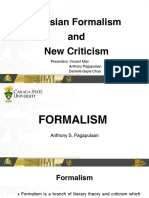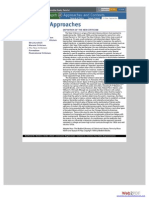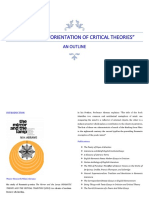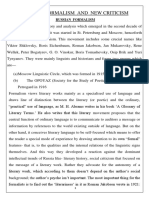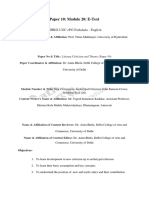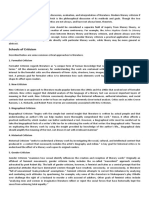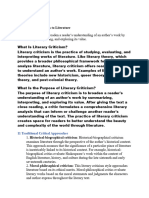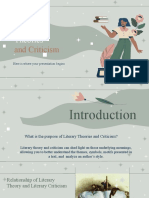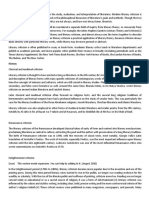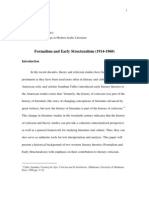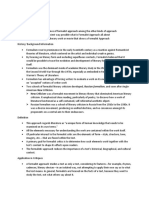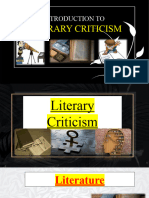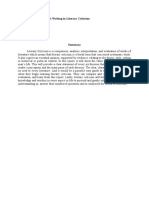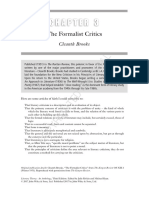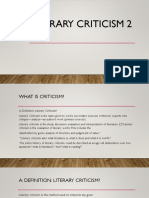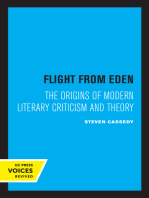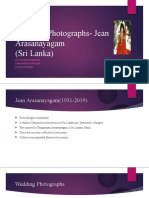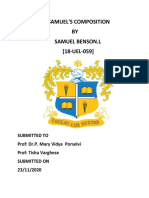Professional Documents
Culture Documents
John Crowe Ransom PDF
Uploaded by
Celestial100%(1)100% found this document useful (1 vote)
81 views2 pagesJohn Crowe Ransom (1888-1974) was an American educator, scholar, literary critic, poet, and editor who helped found the New Criticism school of literary criticism. He was the first editor of the influential Kenyon Review. Ransom argued that literary criticism should focus solely on analyzing the text itself rather than external factors like the author's biography or historical context. Specifically, he believed criticism should exclude personal impressions, summaries, historical studies, linguistic analyses, and moral judgments. Instead, criticism should receive its own authority to conduct technical studies of elements within the text like poetry, rhetoric, and language. Ransom's views emphasized close reading and interpretation of the literal words on the page.
Original Description:
Original Title
John Crowe Ransom.pdf
Copyright
© © All Rights Reserved
Available Formats
PDF, TXT or read online from Scribd
Share this document
Did you find this document useful?
Is this content inappropriate?
Report this DocumentJohn Crowe Ransom (1888-1974) was an American educator, scholar, literary critic, poet, and editor who helped found the New Criticism school of literary criticism. He was the first editor of the influential Kenyon Review. Ransom argued that literary criticism should focus solely on analyzing the text itself rather than external factors like the author's biography or historical context. Specifically, he believed criticism should exclude personal impressions, summaries, historical studies, linguistic analyses, and moral judgments. Instead, criticism should receive its own authority to conduct technical studies of elements within the text like poetry, rhetoric, and language. Ransom's views emphasized close reading and interpretation of the literal words on the page.
Copyright:
© All Rights Reserved
Available Formats
Download as PDF, TXT or read online from Scribd
100%(1)100% found this document useful (1 vote)
81 views2 pagesJohn Crowe Ransom PDF
Uploaded by
CelestialJohn Crowe Ransom (1888-1974) was an American educator, scholar, literary critic, poet, and editor who helped found the New Criticism school of literary criticism. He was the first editor of the influential Kenyon Review. Ransom argued that literary criticism should focus solely on analyzing the text itself rather than external factors like the author's biography or historical context. Specifically, he believed criticism should exclude personal impressions, summaries, historical studies, linguistic analyses, and moral judgments. Instead, criticism should receive its own authority to conduct technical studies of elements within the text like poetry, rhetoric, and language. Ransom's views emphasized close reading and interpretation of the literal words on the page.
Copyright:
© All Rights Reserved
Available Formats
Download as PDF, TXT or read online from Scribd
You are on page 1of 2
JOHN CROWE RANSOM
John Crowe Ransom (1888 –1974) was an American
educator, scholar, literary critic, poet, essayist and editor.
He is considered to be a founder of the New Criticism
school of literary criticism. He was the first editor of the
widely regarded Kenyon Review. Highly respected as a
teacher and mentor to a generation of accomplished
students, he also was a prize-winning poet and essayist.
Ransom’s position is that the critic must study literature,
not about literature. According to Ransom, criticism
should exclude: 1) personal impressions, because the
critical activity should “cite the nature of the object
rather than its effects upon the subject”. 2) synopsis and
paraphrase, since the plot or story is an abstraction from
the real content of the text; 3) historical studies, which
might include literary backgrounds, biography, literary
sources, and analogues; 4) linguistic studies, which
include identifying allusions and meanings of words; 5)
moral content, since this is not the whole content of the
text; 6) “Any other special studies which deal with some
abstract or prose content taken out of the work”.
Ransom demands that criticism, whose proper province
includes technical studies of poetry, metrics, tropes, and
should “receive its own charter of rights and function
independently”. His arguments have often been
abbreviated into a characterization of New Criticism as
focusing on “the text itself ” or “the words on the page”.
SUBMITTED BY
Samuel Benson.L
[18-UEL-059]
[Department of English]
You might also like
- New Criticism and FormalismDocument23 pagesNew Criticism and FormalismApril Joy Catil MasalonNo ratings yet
- Local Media6161530909195901197Document15 pagesLocal Media6161530909195901197ALPETCHE, Venjie Ann R.No ratings yet
- M-5-New Criticism IDocument10 pagesM-5-New Criticism ISumathi NNo ratings yet
- Unit John Crowe Ransom Brooks: 4 AND CleanthDocument13 pagesUnit John Crowe Ransom Brooks: 4 AND CleanthPriya VermaNo ratings yet
- Formalism and New Criticism Presentation SlidesDocument58 pagesFormalism and New Criticism Presentation Slidesdaniellegayle.chuaNo ratings yet
- The New CriticismDocument6 pagesThe New CriticismDhitas Panganiban LumanglasNo ratings yet
- New CriticismDocument176 pagesNew CriticismAmir Ul HasanNo ratings yet
- 10 Literary TheoryDocument90 pages10 Literary TheoryAditya Sahay100% (1)
- Bcs Bedfordstmartins ComDocument1 pageBcs Bedfordstmartins ComCarlos EdreiraNo ratings yet
- 11 Literary TheoryDocument70 pages11 Literary TheoryDr-Mubashar Altaf100% (6)
- Normal 606f55ccdaf2b PDFDocument3 pagesNormal 606f55ccdaf2b PDFBoniamin HossainNo ratings yet
- Formalism: Ammara Farhan PHD English GcwusDocument29 pagesFormalism: Ammara Farhan PHD English GcwusAmmara FarhanNo ratings yet
- BurodipiDocument2 pagesBurodipitalitejujee95No ratings yet
- ApproachesDocument3 pagesApproachesGil YuuNo ratings yet
- New Criticism and It's TenetsDocument12 pagesNew Criticism and It's TenetsKausar ParveenNo ratings yet
- Orientation To Critical Theories AbramsDocument11 pagesOrientation To Critical Theories AbramsSedad DizdarevićNo ratings yet
- Elementary Guide to Literary CriticismFrom EverandElementary Guide to Literary CriticismRating: 4 out of 5 stars4/5 (1)
- "Longinus's Art of Criticism" (In The Eyes of Established Critics)Document6 pages"Longinus's Art of Criticism" (In The Eyes of Established Critics)Kiran.A.K.L100% (1)
- English 10 4th Monthly Exam Fact SheetsDocument4 pagesEnglish 10 4th Monthly Exam Fact Sheetsdnlaligan8No ratings yet
- Term PaperDocument10 pagesTerm PaperMary Hope M. MonteroNo ratings yet
- Russian Formalism and New CriticismDocument6 pagesRussian Formalism and New Criticismmohamed100% (1)
- New Criticism ExamDocument2 pagesNew Criticism ExamprabhuNo ratings yet
- Paper 10Document15 pagesPaper 10Atul RanjanNo ratings yet
- Difference Between Russian Formalism and New CriticismDocument6 pagesDifference Between Russian Formalism and New CriticismRaees Shahid Ali KhanNo ratings yet
- Module 10 Eng 16Document3 pagesModule 10 Eng 16Divine CardejonNo ratings yet
- What Is Literary Criticism?Document3 pagesWhat Is Literary Criticism?Marion NaudNo ratings yet
- Literary Criticism The Formal Approach To LiteratureDocument19 pagesLiterary Criticism The Formal Approach To LiteratureThessalonica BergmanNo ratings yet
- New Criticism What Is New Criticism?Document6 pagesNew Criticism What Is New Criticism?Shanna Ky Opina100% (1)
- 9 Critical Approaches To LiteratureDocument4 pages9 Critical Approaches To Literaturesanjay dasNo ratings yet
- Riphah International University: Subject: Topic: Submitted To: Submitted By: Class: Roll NoDocument3 pagesRiphah International University: Subject: Topic: Submitted To: Submitted By: Class: Roll NoQamar KhokharNo ratings yet
- M-3-Formalism IDocument10 pagesM-3-Formalism ISumathi NNo ratings yet
- Introduction To Literary Criticism 1Document3 pagesIntroduction To Literary Criticism 1Sujatha Menon100% (1)
- Literary CriticismDocument3 pagesLiterary CriticismbullorhianlarraineNo ratings yet
- Development of Literary CriticismDocument6 pagesDevelopment of Literary CriticismGovt. Graduate College for Women Rahim Yar KhanNo ratings yet
- Literary AppreciationDocument6 pagesLiterary AppreciationTaris TallasaNo ratings yet
- Literary Theories & Criticism (Final)Document28 pagesLiterary Theories & Criticism (Final)Alyssa Nicole EsguerraNo ratings yet
- I. What Is Literature Criticism?Document6 pagesI. What Is Literature Criticism?Ga MusaNo ratings yet
- 9 Critical Approaches To LiteratureDocument24 pages9 Critical Approaches To LiteratureCELL IELTSNo ratings yet
- Literary CriticismDocument3 pagesLiterary CriticismCris Tarrazona CasipleNo ratings yet
- Formalism April25Document30 pagesFormalism April25Sudhir ChhetriNo ratings yet
- Literary CriticismDocument2 pagesLiterary CriticismRslyn MorganNo ratings yet
- FormalismDocument4 pagesFormalismCarlos Vincent Oliveros100% (1)
- Formalist ApproachDocument2 pagesFormalist ApproachRhone Christian Narciso Salcedo50% (2)
- Eng10 q3 Intro To Literarycriticismt1Document28 pagesEng10 q3 Intro To Literarycriticismt1sarileella.alexa25No ratings yet
- Unit 2: Formalism: A. B. C. D. eDocument10 pagesUnit 2: Formalism: A. B. C. D. eMayMay Serpajuan-SablanNo ratings yet
- Cuevas - Individual Report WritingDocument18 pagesCuevas - Individual Report WritingGel CuevasNo ratings yet
- What Is LiteratureDocument6 pagesWhat Is LiteratureAri GunawanNo ratings yet
- The Formalist Critics: Cleanth BrooksDocument6 pagesThe Formalist Critics: Cleanth Brooksakhil joseNo ratings yet
- New Criticism & The Intentional Fallacy: Ghufran Amer AbdulridaDocument5 pagesNew Criticism & The Intentional Fallacy: Ghufran Amer AbdulridaghufranNo ratings yet
- Crticism 2Document92 pagesCrticism 2Salwa abNo ratings yet
- FORMALISMDocument4 pagesFORMALISMTheresa Nova Dologmandin-VillaesterNo ratings yet
- Gioia & Kennedy - Critical Approaches To LiteratureDocument29 pagesGioia & Kennedy - Critical Approaches To Literaturesiskaprasasti13579No ratings yet
- Approaches To Literary Analysis - Kennedy & GioiaDocument19 pagesApproaches To Literary Analysis - Kennedy & GioiaJunior LeónNo ratings yet
- Critical Approaches To LiteratureDocument10 pagesCritical Approaches To LiteratureSamNo ratings yet
- FormalismDocument4 pagesFormalismCarlos Vincent OliverosNo ratings yet
- 9 Critical Approaches To LiteratureDocument8 pages9 Critical Approaches To Literaturecryst100% (2)
- Literary CritismDocument8 pagesLiterary CritismRohayu -No ratings yet
- A Dialectical Perspective on the Concept of Romanticism: Multiple Ideologies in an Infinitely Expanding FrameworkFrom EverandA Dialectical Perspective on the Concept of Romanticism: Multiple Ideologies in an Infinitely Expanding FrameworkNo ratings yet
- Flight from Eden: The Origins of Modern Literary Criticism and TheoryFrom EverandFlight from Eden: The Origins of Modern Literary Criticism and TheoryRating: 4 out of 5 stars4/5 (2)
- AD - DesignDocument2 pagesAD - DesignCelestialNo ratings yet
- Print Ad FinalDocument2 pagesPrint Ad FinalCelestialNo ratings yet
- British Fiction HOD (18-UEL-059) PDFDocument2 pagesBritish Fiction HOD (18-UEL-059) PDFCelestialNo ratings yet
- British Fiction (18-UEL-059) PDFDocument2 pagesBritish Fiction (18-UEL-059) PDFCelestialNo ratings yet
- Brief Definition (18-UEL-059) PDFDocument6 pagesBrief Definition (18-UEL-059) PDFCelestialNo ratings yet
- Favourite Literary Critic (18-UEL-059) PDFDocument1 pageFavourite Literary Critic (18-UEL-059) PDFCelestialNo ratings yet
- Wedding Photographs - Jean ArasanayagamDocument8 pagesWedding Photographs - Jean ArasanayagamCelestial100% (1)
- Journal CIA 2 (18-UEL-059) PDFDocument13 pagesJournal CIA 2 (18-UEL-059) PDFCelestialNo ratings yet




